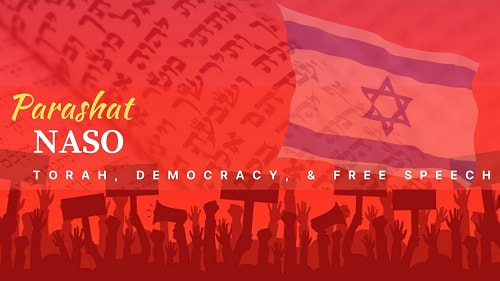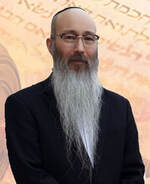|
By: HaRav Menashe Sasson Reporting from Jerusalem, Israel Published in the U.S.A. The Hebrew word “naso” [נשא] means “to carry, bear, lift, or raise; to transfer; to take; to contain; to pardon or forgive; or to suffer or endure.” Continuing a theme from last week’s Parashat, the word “naso,” in the context of our Parashat, means “to take,” as we see in the opening sentence of Parashat Naso. “And HaShem spoke to Moshe, saying, ‘take also a sum [census] of the sons of Gershon. . . .’” Bamidbar 4:21-22. Thus, Parashat Naso begins with a discussion of counting, that is, of taking a census of the Levites and assigning to them various tasks, most notably, to provide music for some of the communal offerings and to prepare the parts of the Mishkan [משכן] that would be carried by the Kohenim when the Jewish people traveled. Parashat Naso then discusses the purification of the camp; stealing from a fellow Jew; the Sotah (in Hebrew spelled either as [סוטה] or [שוטה], with the former spelling translated as “pervert” and the latter translated as “fool”); the Nazir [נזיר] (translation: “monk”); the Priestly Blessing; offerings of the tribal leaders; and a summary of the dedication of the Alter. Parashat Naso concludes with the pasuk:
Bamidbar 7:88-79. The Talmud interprets this pasuk to mean that “Moshe heard [HaShem speak], but the Jewish people did not hear.” T.B. Masekhet Yoma 4b. Likewise, we learn from the Nevi’im [נביאים] that when HaShem called to Shemu’el, only Shemu’el heard the voice of HaShem, even though Eli was also present. I Shemu’el 3:4. Rashi commented that “HaShem’s voice emerged from the Sanctuary, from the Holy of Holies. Eli was a priest standing guard inside [the Sanctuary], while Shemu’el was a Levite who was standing outside. HaShem’s voice bypassed Eli and directed itself to Shemu’el.” At the time, Eli was the Judge of all of Yisra’el; Shemu’el was a mere child. From this we can learn that, because the minority sometimes hears or sees what the majority does not; that is, because sometimes the truth lies with the minority, one who hears or sees what the majority does not, should not allow himself to be silenced by the majority. This is true even when the majority is composed of great individuals, as was the case with Eli and Shemu’el. “Democracy,” that is, the concept of majority rule, is based on the premise that the will of the majority should prevail. However, there is no necessary reason to suggest that the majority opinion on any particular subject represents the truth. As Rabbi Yehudah explained, “The minority view is recorded [in the Mishnah] along with the majority view so that it is available to become the applicable law whenever the circumstances are appropriate.” Tosefta Eduyyot 1:4 (Zukermandel ed.); see, Mishnah Eduyyot 1:5. The Talmud, in what could be described as its “free speech clause,” discusses the “rebellious elder,” who disagreed with a decision of the Sanhedrin. According to the Talmud, the rebellious elder was allowed to continue asserting the correctness of his minority opinion and was allowed to “teach [his minority opinion] in the same way that he [had] previously taught,” so long as he does not represent that his minority opinion constitutes Halakha. Mishnah Sanhedrin 11:2; T.B. Masekhet Sanhedrin 86b. There is ample basis today for a person to legitimately hold a minority opinion and conclude that contemporary understandings or applications of Halakha by a majority of Jews outside of Medinat Yisrael, and by a sizable percentage inside the Medinat, are demonstrably incorrect. For example, some of the more consequential issues include:
The Torah is what makes a Jew a Jew. Without the Torah, there are no Jews, there is no Jewish people, no Jewish nation, and, by implication, no Jewish homeland. Without the Torah, Medinat Yisra’el is just another country, one among many, with no special significance. Thankfully, however, we have the Torah. May we, as Jews, all be blessed to learn and apply Torah to both our personal and national lives, and for each of us to do our part in bringing the Redemption, speedily in our days. שבת שלום Shabbat Shalom! Copyright © The Israel Foundation. All Rights Reserved.
0 Comments
Your comment will be posted after it is approved.
Leave a Reply. |
THE ISRAEL FOUNDATION





